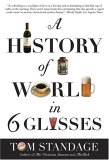Summary | Excerpt | Reviews | Beyond the Book | Readalikes | Genres & Themes | Author Bio

Critics' Opinion:
Readers' Opinion:
First Published:
Jun 2005, 240 pages
Paperback:
May 2006, 311 pages
 Book Reviewed by:
Book Reviewed by:
BookBrowse Review Team
Buy This Book
Introduction
Vital Fluids
There is no history of mankind, there are only many
histories of all kinds of aspects of human life.
—Karl
Popper, philosopher of science (1902–94)
Thirst is deadlier than hunger. Deprived of food,
you might survive for a few weeks, but deprived of
liquid refreshment, you would be lucky to last more
than a few days. Only breathing matters more. Tens of thousands
of years ago, early humans foraging in small bands had
to remain near rivers, springs, and lakes to ensure an adequate
supply of freshwater, since storing or carrying it was impractical.
The availability of water constrained and guided humankind’s
progress. Drinks have continued to shape human history
ever since.
Only in the past ten thousand years or so have other beverages
emerged to challenge the preeminence of water. These
drinks do not occur naturally in any quantity but must be
made deliberately. As well as offering safer alternatives to contaminated,
disease-ridden water supplies in human settlements,
these new beverages have taken on a variety of roles. Many of
them have been used as currencies, in religious rites, as political
symbols, or as sources of philosophical and artistic inspiration.
Some have served to highlight the power and status of the
elite, and others to subjugate or appease the downtrodden.
Drinks have been used to celebrate births, commemorate
deaths, and forge and strengthen social bonds; to seal business
transactions and treaties; to sharpen the senses or dull the
mind; to convey lifesaving medicines and deadly poisons.
As the tides of history have ebbed and flowed, different
drinks have come to prominence in different times, places, and
cultures, from stone-age villages to ancient Greek dining rooms
or Enlightenment coffeehouses. Each one became popular when
it met a particular need or aligned with a historical trend; in
some cases, it then went on to influence the course of history
in unexpected ways. Just as archaeologists divide history into
different periods based on the use of different materials—the
stone age, the bronze age, the iron age, and so on—it is also
possible to divide world history into periods dominated by
different drinks. Six beverages in particular—beer, wine, spirits,
coffee, tea, and cola—chart the flow of world history. Three
contain alcohol, and three contain caffeine, but what they all
have in common is that each one was the defining drink during
a pivotal historical period, from antiquity to the present
day.
The event that set humankind on the path toward modernity
was the adoption of farming, beginning with the domestication
of cereal grains, which first took place in the Near East around
ten thousand years ago and was accompanied by the appearance
of a rudimentary form of beer. The first civilizations arose
around five thousand years later in Mesopotamia and Egypt,
two parallel cultures founded on a surplus of cereal grains produced
by organized agriculture on a massive scale. This freed a
small fraction of the population from the need to work in the
fields and made possible the emergence of specialist priests,
administrators, scribes, and craftsmen. Not only did beer nourish
the inhabitants of the first cities and the authors of the first
written documents, but their wages and rations were paid in
bread and beer, as cereal grains were the basis of the economy.
The flourishing culture that developed within the city-states of
ancient Greece in the first millennium BCE spawned advances in
philosophy, politics, science, and literature that still underpin
modern Western thought. Wine was the lifeblood of this Mediterranean
civilization, and the basis of vast seaborne trade that
helped to spread Greek ideas far and wide. Politics, poetry, and
philosophy were discussed at formal drinking parties, or symposia,
in which the participants drank from a shared bowl of
diluted wine. The spread of wine drinking continued under the
Romans, the structure of whose hierarchical society was reflected
in a minutely calibrated pecking order of wines and wine styles.
Two of the world’s major religions issued opposing verdicts on
the drink: The Christian ritual of the Eucharist has wine at its
center, but following the collapse of the Roman Empire and the
rise of Islam, wine was banned in the very region of its birth.
From A History of The World In 6 Glasses by Tom Standage. Copyright Tom Standage 2005. All rights reserved. No part of this book maybe reproduced without written permission from the publisher, Walker & Company.





The Funeral Cryer by Wenyan Lu
Debut novelist Wenyan Lu brings us this witty yet profound story about one woman's midlife reawakening in contemporary rural China.
Your guide toexceptional books
BookBrowse seeks out and recommends the best in contemporary fiction and nonfiction—books that not only engage and entertain but also deepen our understanding of ourselves and the world around us.